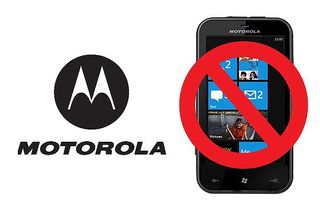Motorola Mobility gets downgraded. (Or How's that Android-only strategy working out for ya?)

Motorola was at one time a big Microsoft partner, making one of the "slimmest" Windows Mobile devices back in the hey day. Then, surprisingly, they backed completely away from MS, going steady with Google. To refresh, back in February of this year, Christy Wyatt, corporate vice president of software and services product management for Motorola, was boasting about their Android-only approach and criticised Windows Phone 7:
"I don't envision us using Microsoft. I would never say never but it's not something we're entertaining now". Going further, she brags "We're the only vendor who is 100 percent Android".
Reason? "We would like an opportunity to create unique value and we don't feel we could with a closed platform", referring of course to the Windows Phone restrictions on modifying the OS. Obviously, Android was a panacea, allowing the company to flourish and dominate the market, especially with their cozy Verizon relationship under the marketing gimmick of 'Droid.
Then about five months passed and whoops, Motorola is back in a slump having their stock drop 38%. From the Dow Jones Newswire:
“Motorola Mobility’s share of the Google Android-powered smartphone market has plunged as Samsung, LG and Sony Ericsson have gotten up to speed, BMO says, and more competition is on the way from low-end players like China’s Huawei.“MMI had an “early mover” advantage with its release of the Droid in 2009, but its Android share slid to 14% in 1Q from 33% a year earlier, analysts say. BMO sees MMI, the leader in the Android race in early 2010, coming in fifth in 2Q."
As a result, BMO is now downgrading Motorola Mobility "...to under perform, cuts EPS targets for this year and next and lowers price target to $19 from $26". Ouch.
Anyone remember the RAZR and what happened with that winning strategy? Evidently Motorola doesn't. It's clear that the Android market is completely flooded with similar devices, is cut throat and is harder and harder for companies to differentiate their products. Combined with Motorola's one-trick pony attempts at innovation, this was bound to happen. While adding Windows Phone to their portfolio might not completely turn them around, we would think it might help a smidge.
Come on Moto, do the right thing. Call up Microsoft and make a deal to make some Windows Phones--perhaps even throwing out a new, unique design (the Motorola Q and Q9 were pretty awesome). You make good keyboards and have great speakers, so lets help each other out. You're not Nokia, but you're not bad either. Friends?
Source: MarketBeat (WSJ)
Get the Windows Central Newsletter
All the latest news, reviews, and guides for Windows and Xbox diehards.

Daniel Rubino is the Editor-in-chief of Windows Central. He is also the head reviewer, podcast co-host, and analyst. He has been covering Microsoft since 2007, when this site was called WMExperts (and later Windows Phone Central). His interests include Windows, laptops, next-gen computing, and watches. He has been reviewing laptops since 2015 and is particularly fond of 2-in-1 convertibles, ARM processors, new form factors, and thin-and-light PCs. Before all this tech stuff, he worked on a Ph.D. in linguistics, watched people sleep (for medical purposes!), and ran the projectors at movie theaters because it was fun.
